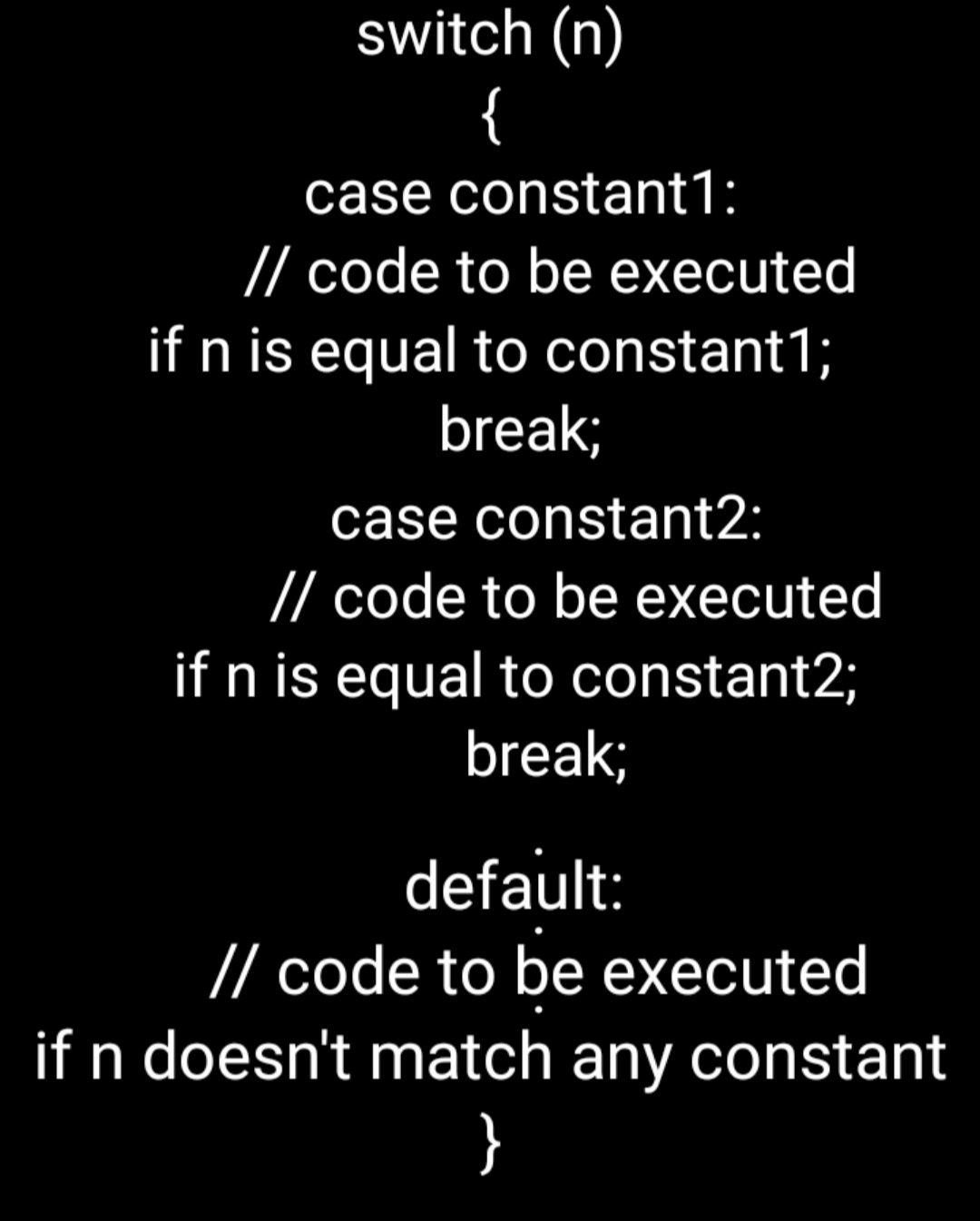FUNCTION
A function is a set of statements that take inputs, do some specific computation and produces output.
Advantage of functions in C :
The idea is to put some commonly or repeatedly done task together and make a function, so that instead of writing the same code again and again for different inputs, we can call the function.
•Types of function :
Depending on whether a function is defined by the user or already included in C compilers, there are two types of functions in C programming
- Library Functions : functions which are declared in the C header files such as scanf(), printf(), gets(), puts(), ceil(), floor() etc.
- User Defined Functions : functions which are created by the C programmer, so that he/she can use it many times. It reduces the complexity of a big program and optimizes the code.
Advantage of functions in C :
- By using functions, we can avoid rewriting same logic/code again and again in a program.
- We can call C functions any number of times in a program and from any place in a program.
- We can track a large C program easily when it is divided into multiple functions.
- Reusability is the main achievement of C functions. However, Function calling is always a overhead in a C program.
1.ADDITION PROGRAMME USING FUNCTION:
#include<stdio.h>
void add()
{
int x,y=70,z=50;
x=y+z;
printf("Add=%d",x);
}
int main()
{
add();
}
•Output
Add=120
2.SUBTRACTION PROGRAMME USING FUNCTION:
#include<stdio.h>
void sub()
{
int x,y=70,z=50;
x=y-z;
printf("Sub=%d",x);
}
int main()
{
sub();
}
•Output
Sub=20
3.MULTIPLICATION PROGRAMME USING FUNCTION:
#include<stdio.h>
void multi()
{
int x,y=70,z=50;
x=y*z;
printf("Multi=%d",x);
}
int main()
{
multi();
}
•Output
Multi=3500
4.DIVISION PROGRAMME USING FUNCTION:
#include<stdio.h>
void div()
{
int x,y=40,z=5;
x=y/z;
printf("Div=%d",x);
}
int main()
{
div();
}
•Output
Div=8
5.RECTANGLE AREA USING FUNCTION:
#include<stdio.h>
void area(int height,int width)
{
int ar=height*width;
printf("Area of rectangle=%d",ar);
}
int main()
{
int h,w;
printf("Enter height=");
scanf("%d",&h);
printf("Enter width=");
scanf("%d",&w);
area(h,w);
}
•Output
Enter height
20
Enter width
30
Area of rectangle =600
6.CIRCLE AREA USING FUNCTION:
#include<stdio.h>
void area(float radius)
{
float ar=3.14*radius*radius;
printf("Area of circle=%f",ar);
}
int main()
{
float r;
printf("Enter radius of circle=");
scanf("%f",&r);
area(r);
}
•Output
Enter radius of Circle
2.2
Area of Circle= 15.197
7.FUNCTION WITH NO RETURN TYPE AND NO PARAMETER:
#include<stdio.h>
void add()
{
int x,y=70,z=50;
x=y+z;
printf("Add=%d",x);
}
int main()
{
add();
}
•Output
Add=120
8.FUNCTION WITH NO RETURN TYPE AND WITH PARAMETER:
#include<stdio.h>
int add(int y,int z)
{
int x;
x=y+z;
return x;
}
int main()
{
printf("Add=%d",add(10,20));
}
•Output
Add=30
9.FUNCTION WITH RETURN TYPE AND WITH NO PARAMETER:
#include<stdio.h>
int add()
{
int x,y=70,z=50;
x=y+z;
return x;
}
int main()
{
printf("Add=%d",add());
}
•Output
Add=120
10.FUNCTION WITH RETURN TYPE AND WITH PARAMETER:
#include<stdio.h>
int add(int y,int z)
{
int x;
x=y+z;
return x;
}
int main()
{
printf("Add=%d",add(10,20));
}
•Output
Add=30
11.CALL BY VALUE:
#include<stdio.h>
void add(int y,int z)
{
int x;
x=y+z;
printf("Add=%d",x);
}
int main()
{
add(10,20);
}
•OUTPUT
Add=30
12.CALL BY REFERENCE:
#include<stdio.h>
int add(int *y,int *z)
{
int x;
x=*y+*z;
printf("Add=%d",x);
}
int main()
{
int a=20,b=50;
add(&a,&b);
}
•OUTPUT
Add=70
13.FUNCTION WITH DEFAULT PARAMETER :
#include<stdio.h>
int add(int y=10,int z=20)
{
int x;
x=y+z;
printf("Add=%d\n",x);
}
int main()
{
printf("Without Parameter\n");
add();
printf("With Parameter\n");
add(40,60);
}
•Output
Without parameter
Add=30
With parameter
Add=100
14.PASSING ARRAY TO FUNCTION:
#include<stdio.h>
int array(int arr[5])
{
int sum=0;
printf("Element is given below\n");
for(int i=0;i<=4;i++)
{
printf("%d ",arr[i]);
sum=sum+arr[i];
}
printf("\nTotal Sum=%d",sum);
}
int main()
{
int b[5];
printf("ENter 5 integer value one by one\n");
for(int j=0;j<=4;j++)
scanf("%d",&b[j]);
array(b);
}
•OUTPUT
Enter 5 integer value one by one
10
50
60
70
90
Element is given below
10 50 60 70 90
Total sum =280
15.RECURSION PROGRAMME IN FUNCTION:
#include<stdio.h>
int table(int no)
{
if(no!=11)
{
printf("%d\n",no);
no++;
table(no);
}
}
int main()
{
table(1);
}
•Output
1
2
3
4
5


Comments